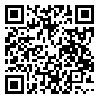BibTeX | RIS | EndNote | Medlars | ProCite | Reference Manager | RefWorks
Send citation to:
URL: http://yafte.lums.ac.ir/article-1-2416-en.html
Background : Love Trauma refers to a state of frustration and humiliation felt by the person who is rejected by his/her beloved. The present study was aimed at studying the effectiveness of Emotion-Focused Approach for cognitive emotion regulation of female university students who experienced Love Trauma.
Materials and Methods: This study was a quasi-experimental research including a pre-test, a post-test, and a follow-up test with the control group. The statistical population included all female students of Ahvaz universities who had experienced Love Trauma in 2014-2015. The total number of participants was 22, out of which 11 participants (who showed willingness) were chosen for the experimental group. The remaining 11 participants were placed in the control group. The Love Trauma Inventory and Cognitive Emotion Regulation Questionnaire were used as the instruments of the research. All participants answered both questionnaires. Then the members of experimental group received the treatment intervention during eight personal 60-minute sessions held twice a week. After that, both groups answered CERQ again. One month after the experiment, the follow-up test was conducted for both groups. The collected data was analyzed by descriptive statistics and Multivariable Analyze of Covariance (MANCOVA).
Results: The findings indicated that the Emotion-Focused Approach in the post-test and follow-up test has provoked more positive strategies for cognitive emotion regulation in the experimental group in comparison with the control group
Conclusion: Since love and other feelings associated with Love Trauma are classified under the category of emotions, the Emotionally-Focused Therapy can have a significant influence on the cognitive emotion regulation of female students suffering from Love Trauma.
Received: 2017/03/6 | Accepted: 2017/03/6 | Published: 2017/03/6
| Rights and permissions | |
 |
This work is licensed under a Creative Commons Attribution-NonCommercial 4.0 International License. |





